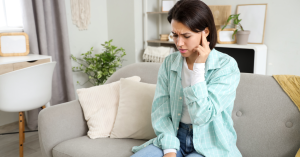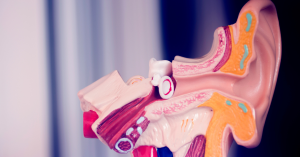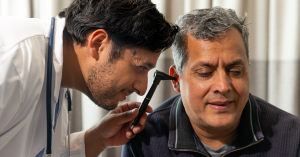Crowded rooms can be lively, exciting, and full of energy—but for many people, they’re also incredibly frustrating. If you’ve ever found yourself straining to catch a friend’s words at a party, missing key points during a busy event, or nodding along in confusion in a bustling restaurant, you’re not alone. Hearing in crowds is one of the most common challenges people face as they get older, and it can be especially tough for those with hearing loss.
But here’s the good news: there are practical, effective ways to improve your hearing in noisy environments. It’s not just about turning up the volume—hearing clearly in a crowd requires the coordination of your ears and your brain, as well as strategies for managing sound, positioning yourself wisely, and using modern technology to your advantage.
This article will walk you through why crowded spaces are so difficult for hearing, and more importantly, what you can do to change that. From quick fixes you can try tonight to long-term habits that support your hearing health, we’ll give you tools that really work—so you can focus more on the conversation and less on the struggle to hear it.
Why Hearing in Crowds Is So Difficult
If you find it easier to hear one-on-one in a quiet room than in a bustling restaurant or party, you’re not imagining things. Crowded environments pose a unique and complex challenge to our hearing system, especially as we age or if hearing loss is present.
1. Competing Sounds in the Same Frequency Range
In crowded rooms, everyone talks at once—and most voices fall within similar pitch ranges. This creates a dense “wall” of sound that’s difficult to separate.
2. Background Noise Masks Speech
Common noises like clinking glasses, background music, or general chatter create auditory masking that covers up the sounds you want to hear.
3. The Cocktail Party Effect Breaks Down
The cocktail party effect helps your brain focus on one voice in noise. With age or hearing loss, this ability weakens, making it harder to follow conversations.
4. Poor Room Acoustics
Hard surfaces reflect sound and create reverberation, blurring speech and making individual words harder to distinguish.
5. Lack of Visual Cues
In noisy settings, lipreading and facial expressions are harder to see, which removes key visual context that supports understanding.
Together, these factors make hearing in crowds one of the most difficult listening tasks—even for people with relatively good hearing.
Quick Fixes: Immediate Ways to Hear Better in Noisy Places
You don’t have to wait for a hearing appointment or new technology to start improving your hearing in crowds. Simple changes in behavior and awareness can make a big difference.
1. Be Strategic About Where You Sit
- Sit with your back to a wall.
- Choose seats away from speakers or high-traffic areas.
- Face your conversation partner.
2. Reduce Background Noise
- Ask to lower background music.
- Move to a quieter corner of the room.
- Minimize competing sounds at home during gatherings.
3. Focus on One Speaker
- Concentrate on one voice at a time.
- Look at the person as they speak.
- Politely ask others to speak one at a time in group settings.
4. Use Non-Verbal Cues
- Watch for facial expressions and gestures.
- Let people know what helps you (e.g., speaking clearly or facing you).
5. Be Honest About Your Needs
It’s okay to ask to move to a quieter space or ask someone to repeat themselves. Most people are happy to help when they know what you need.
Technology That Helps: Hearing Aids, Apps, and Assistive Devices
Technology offers long-term solutions for hearing better in crowds.
1. Hearing Aids with Directional Microphones
Modern hearing aids include:
- Directional microphones to focus on front-facing speech
- Noise reduction algorithms to filter out background sounds
- Automatic scene detection for dynamic environments
2. Smartphone Apps for Live Transcription
Useful apps include:
- Live Transcribe (Android)
- Otter.ai
- Ava
These provide real-time captions when listening is difficult.
3. Remote Microphones and Accessories
- Microphones worn by a speaker or placed on a table transmit directly to hearing aids.
- These significantly improve signal-to-noise ratio in group settings.
4. Personal Sound Amplifiers (PSAPs)
Over-the-counter devices that boost sound. Useful for those with mild hearing loss or not yet using hearing aids.
5. Bluetooth Earbuds with Conversation Modes
Devices like Apple’s AirPods Pro include features like transparency mode or conversation boost that help clarify nearby voices.
Train Your Brain: Long-Term Habits to Improve Hearing in Crowds
Your brain plays a key role in hearing—and you can train it.
1. Practice Focused Listening
- Try to follow one voice in a noisy room.
- Use talk shows or podcasts with background noise for practice.
2. Use Auditory Training Programs
Apps like:
- LACE (Listening and Communication Enhancement)
- Amptify
- Hearoes
These help improve speech-in-noise comprehension over time.
3. Read Aloud While Listening to Audiobooks
Combining audio and text improves the brain’s ability to process speech sounds.
4. Stay Socially Engaged
Avoiding social situations can weaken your listening stamina. Stay engaged to keep your auditory processing sharp.
5. Support Brain Health
Healthy brain = better hearing. Prioritize:
- Sleep
- Physical activity
- Mental stimulation
- Balanced nutrition
When to Seek Professional Help
If challenges persist, it’s time to consult a hearing care provider.
1. Recognize the Signs
- You frequently ask for repeats in noise
- You avoid social events
- People seem to mumble
- You feel mentally exhausted after events
2. Get a Hearing Test
An audiologist can identify hearing loss, assess speech-in-noise difficulty, and recommend a personalized plan.
3. Explore Tailored Solutions
This may include:
- Hearing aids
- Assistive devices
- Communication training
4. Act Early
Untreated hearing loss can lead to isolation and cognitive decline. Early intervention makes adaptation easier.
5. Build a Support Team
Audiologists provide ongoing support to improve your daily hearing experience.
Conclusion
Hearing in crowds is tough—but not impossible. Whether through quick strategies, hearing technology, or brain training, you can improve your ability to hear and connect in noisy environments.
If you’re frequently frustrated or feeling disconnected in social settings, don’t wait. Seek help, explore your options, and start making small changes today. Better hearing in crowds is within reach—and it’s worth every step.
FAQ
Why is it so hard to hear in crowds, even if my hearing seems fine at home?
Crowded environments involve multiple competing sounds, overlapping speech, and background noise that make it harder for your brain to isolate individual voices. Even people with good hearing can struggle in these conditions—especially without visual cues or in echo-prone spaces.
Will hearing aids really help me in noisy places?
Yes—especially modern digital hearing aids with directional microphones and noise reduction features. These technologies are designed specifically to enhance speech and minimize background noise, making conversations in crowds much easier to follow.
Can apps or earbuds replace hearing aids in crowds?
For mild hearing loss or specific situations, apps and earbuds (like those with transparency or conversation boost modes) can help. However, they are not a replacement for professional hearing aids, especially for more significant hearing challenges.
Is there a way to train my ears or brain to hear better in noise?
Absolutely. Auditory training programs, focused listening exercises, and even regular social engagement can improve how your brain processes speech in noise over time. Think of it like mental fitness for your hearing.
When should I get a hearing test?
If you frequently struggle in crowds, ask people to repeat themselves, or feel drained after social events, it’s a good time to get your hearing tested. Early intervention leads to better outcomes and helps preserve your ability to enjoy conversations and social interactions.
This article is for informational purposes only and is not a substitute for professional medical advice, diagnosis, or treatment. If you are concerned about your hearing or ear health, please consult a qualified healthcare provider.






